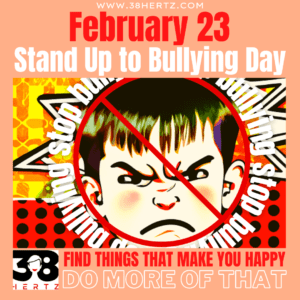
Stand up to Bullying Day is Today!
International Stand up to Bullying Day marks an important annual event dedicated to tackling the growing problem of bullying. The day recognizes that everyone has suffered from this form of violence, which often leaves lasting effects on people’s lives. It’s an opportunity to remind ourselves how serious bullying can be and take action against it.
It encourages students, teachers, and school administrators to work together in creating a safe environment for all people regardless of age, race or gender. Additionally, it promotes respect and understanding with initiatives such as anti-bullying campaigns and support networks for those affected by bullying.
STAND UP TO BULLYING DAY: HISTORY OF ANTI-BULLYING MOVEMENTS
The fight against bullying has been an ongoing battle for many years, with the earliest recorded anti-bullying movements taking place in the 1940s. Since then, a wide variety of approaches have been used to combat bullying including zero tolerance policies, school-based initiatives, and increased public awareness campaigns.
Despite these efforts, bullying still remains a problem in many communities today, but increasing understanding about the harms it can cause to its victims is helping to bring attention to this growing issue. As more people come together to work toward ending bullying, hopefully more children will be able to live in environments free from the distress that comes with being bullied.
STAND UP TO BULLYING DAY: TEN WAYS BULLYING AFFECTS CHILDREN
- Emotional Impact: Bullying often results in heightened emotions, including anxiety, fear, and stress. Children may experience feelings of sadness, loneliness, or helplessness.
- Low Self-Esteem: Persistent bullying can erode a child’s self-esteem. Constant criticism and negative experiences may lead to feelings of inadequacy and a negative self-image.
- Academic Performance: Bullying can interfere with a child’s ability to concentrate and succeed academically. The emotional toll may affect their motivation, attendance, and overall school performance.
- Social Withdrawal: Children who are bullied may withdraw from social interactions, isolating themselves to avoid further negative experiences. This isolation can contribute to feelings of loneliness and depression.
- Physical Health Issues: The stress and anxiety caused by bullying can manifest in physical symptoms, such as headaches, stomachaches, and sleep disturbances. Chronic stress may also weaken the immune system.
- Development of Mental Health Conditions: Bullying is linked to an increased risk of mental health issues, including depression, anxiety disorders, and, in severe cases, suicidal ideation.
- Impact on Relationships: Bullying can affect a child’s ability to form healthy relationships. Trust issues, fear of rejection, and difficulty in social situations may result from past bullying experiences.
- Long-Term Consequences: The effects of bullying can extend into adulthood, influencing a person’s self-perception, coping mechanisms, and interpersonal relationships well beyond their childhood years.
- Behavioral Changes: Bullied children may exhibit changes in behavior, such as becoming more aggressive, exhibiting avoidance behaviors, or developing a tendency to self-isolate.
- Cyberbullying Effects: In the digital age, cyberbullying amplifies the negative impact of traditional bullying. Online harassment can lead to increased feelings of vulnerability, humiliation, and social exclusion.
HOW TO CELEBRATE INTERNATIONAL STAND UP TO BULLYING DAY
- Share an anti-bullying quote – post it on social media.
- Watch and share videos on anti bullying.
- Promote anti-bullying with these things.
- Download the Run, Walk, Roll Against Bullying Event Planning Toolkit.
- If you love the article image, purchase it on these fun products on Zazzle!
Note: If the above links do not direct you to the appropriate referral on the first try, return to the article and try again.
Do you have any ideas about how to celebrate this day? Please share them!


